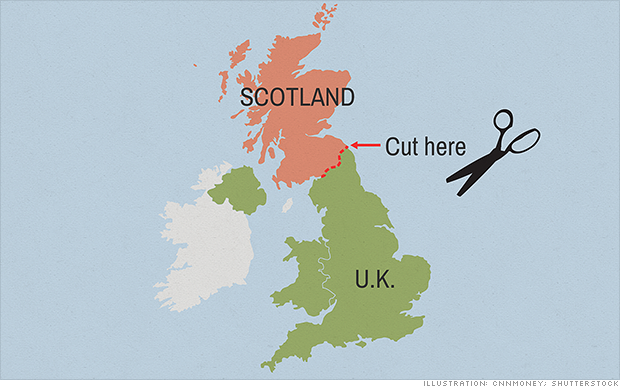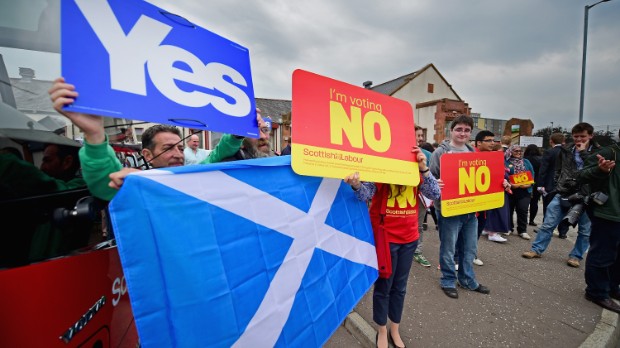 Recent opinion polls show Scots could vote to break away from the United Kingdom on September 18. LONDON (CNNMoney) Investors are selling British stocks and the pound before Scotland votes next week on whether to break away from the United Kingdom.
Recent opinion polls show Scots could vote to break away from the United Kingdom on September 18. LONDON (CNNMoney) Investors are selling British stocks and the pound before Scotland votes next week on whether to break away from the United Kingdom. A vote in favor of independence would end a 307-year union with England and have far reaching consequences for the economy, currency, banks and industry. There could also be knock-on effects across Europe.
Here are five things you need to know:
1. Currency mess: The pound hit a 10-month low against the dollar this week as opinion polls swung in favor of voters who want to break away from the U.K.
Uncertainty over which currency an independent Scotland will use, and the impact of a messy divorce on the U.K. economy, is largely to blame.
Independence campaigners want to continue to use the pound in a currency union with England, but U.K. lawmakers say they're not ready to share. And even if they were, the Bank of England would likely insist on tough budget rules that could mean painful austerity for Scotland.
Scottish nationalist leader Alex Salmond has refused to outline a 'Plan B', though he's hinted that Scotland may continue to use the pound without U.K. permission. Another option would be to create a new, untested currency.
The euro, if an option at all, would be years away. (See "EU: In or out?" below.)
2. The debt debate: In an early move to reassure markets, the U.K. government said it would honor all its debts -- including Scotland's share -- if there is a split.
However, under this scenario, an independent Scotland would owe Britain as much as £130 billion -- or roughly 10% of total U.K. public debt.
Supporters of independence say they're ready to pay, and are confident Scotland could manage its debts with greater ease once independence is established.
However, credit ratings agency Standard & Poor's cautions that Scotland's economy -- which would be similar in size to Portugal -- would be less resilient to shocks because of its greater dependence on volatile earnings from the oil and gas industry.
3. All about oil: The U.K. is the largest oil producer in the EU, and about 90% comes from areas that are likely to be claimed by an independent Scotland.
The U.K. is also likely to want a share of current production and reserves, but most analysts expect an agreement could be reached o! n divvying up the assets.
There are deeper divisions, however, over how much the remaining oil is worth -- a calculation of much greater significance to the future of the Scottish economy.
Independence campaigners estimate Scotland's remaining oil is worth about £1.5 trillion. The U.K. government says it's less than one-tenth of that figure.
4. A financial giant: Shares in British financial institutions based in Scotland, such as Royal Bank of Scotland (RBS) and Lloyds (LYG), have been battered by concerns that a vote in favor of independence could damage their business. RBS has said it could hurt its credit rating and raise costs.
Scotland's outsized banking sector would be 12 times the size of its economy, raising concerns about the country's ability to deal with a future financial crisis.
Large banks and insurers may even be forced to move their headquarters out of Scotland and into London.
Leading this potential migration could be investment firm Standard Life (SLFPF), which has been based in Scotland for roughly 190 years.
"If anything were to threaten [our business] we will take whatever action we consider necessary -- including transferring parts of our operations from Scotland," said Standard Life chairman, Gerry Grimstone.
 Pound slides on Scottish uncertainty
Pound slides on Scottish uncertainty 5. EU: In or out? Independence campaigners want Scotland to remain in the EU.
But an independent Scotland would most likely be treated as a new state, and therefore have to apply for membership. That process can take years and all 28 members would have to approve the application -- something some may be reluctant to do for fear of encouraging their own separatist movements.
And there's another potential sting in the tail that could be far! more dam! aging for the U.K.
Prime Minister David Cameron has promised a vote on Britain's membership of the EU by the end of 2017, assuming he wins next year's election.
"For the rest of the U.K., losing relatively pro-EU Scotland would raise the risk of a Brexit from the EU," warned Robert Wood, chief UK economist at Berenberg bank.
No comments:
Post a Comment